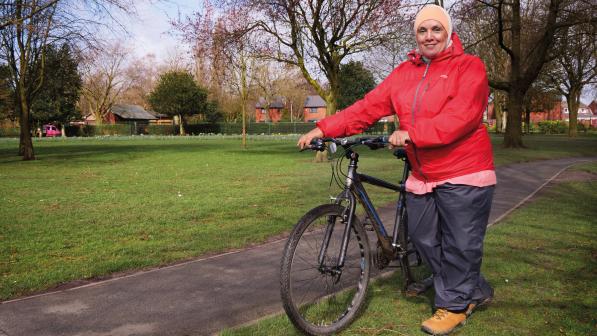Will 'cycling on prescription' work?

This week, the government announced £12.7m of funding to support the delivery of active travel social prescribing pilots in 11 locations across England.
While social prescribing may not be anything new, Cycling UK is looking at these pilots as great opportunities to build on previous successes, investigate new ways of working, and in the long run, influence future funding and much needed collaboration between health departments, transport and sport & physical activity.
The benefits of being more active are well known, well documented and just plain facts. Cycling has a unique role to play in this; not only will cycling boost your mental and physical well-being, it’s also a great way to reduce your carbon footprint, do your bit for the environment and reduce a bit of traffic from the already congested roads.
So, encouraging more people to choose to cycle for short journeys and providing intensive support to make that change – well I’m all for it.
Social prescribing supports those most at need; perhaps it’s helping to manage a long-term health condition, recover from injury or reduce the impacts on your body from diabetes or obesity.
The local authorities chosen to deliver the active travel social prescribing pilots have identified areas within their authority with the highest health need or lowest levels of physical activity, so we can be confident they’re targeting the activity in the locations where most impact can be seen. They’re also looking to link this to existing and planned infrastructure developments – a win-win right?
Connecting behaviour change projects with walking and cycling infrastructure will give valuable learning in understanding how habits can change when both their personal circumstances and their environment work together.
Connecting behaviour change projects with walking and cycling infrastructure will give valuable learning in understanding how habits can change.
Jenny Box
At Cycling UK, we’ve been working on the behaviour change bit for many years now. In West Yorkshire, in partnership with West Yorkshire Combined Authority’s CityConnect programme, we’ve been delivering our Cycle for Health project to provide a safe, supported environment to learn to cycle, build confidence and skills and enable over 1,000 people to change their behaviour to help improve their mental and physical health.
By working with local charities, occupational therapists and the health service, we’ve been delivering courses year-round giving participants 12 weeks of sessions to help them feel more capable and confident on a bike. These new active travel social prescribing pilots provide an excellent opportunity for more projects of this nature to be delivered in more places.
The newly announced pilots are running until 2025… a three-year pilot allows for proper time to develop, deliver and evaluate the activities, something that you just wouldn’t get from a one-year funding pot. With 11 projects of similar nature there’ll be lots of data helping to inform future policy and hopefully, funding decisions for revenue.
It’s true that increased activity alone is not going to solve all problems or fix all ills, and a bit of cycling isn’t going to be a silver bullet but - and allow me my soapbox briefly – by providing opportunities to be more active, and then integrating that activity into your lifestyle (cycling for short journeys, your commute, popping to the shops) we will make healthy lifestyles more sustainable.
Increasing our levels of physical activity helps to make us feel better, and there’s loads of evidence out there to back that up. And with a boost of endorphins, you’re more likely to eat better, sleep better and look after yourself better which contributes to the holistic approach required to make long term behaviour change.

At Cycling UK, we use behavioural science in the design of all our interventions, so we can be most confident that we’ll help people to make lifestyle changes which support their overall mental and physical well-being.
Returning to our Cycle for Health project, not only did we see people starting to cycle, but participants also reported feeling happier and more connected to their community. And just as encouraging, people were meeting the recommended weekly amount of exercise and continued to cycle after the course had ended.
Reflecting on these successes and looking at the new Active Travel Social Prescribing pilots, it’s going to be crucial that the chosen authorities are thinking about how to support individuals to continue to travel more actively after their specific course or intervention has been completed.
It won’t be enough to provide a block of cycle training or a walking group for a set period of time: inactive or more vulnerable participants will require longer term support with relevant opportunities to stay involved. I’m hopeful we’ll start to see links to existing cycle groups, like Cycling UK’s Community Cycle Clubs, or social walking groups embedded in the community.
Alternatively, personal travel planning or bike buses to workplaces could help people feel more comfortable and confident to choose an active commute. With local partnerships being fostered across health systems, transport and sport & physical activity sectors, the potential for success is high with these pilots delivering in new ways to specific audiences.
I’m excited to see how this latest intervention in England develops and at Cycling UK, we’re keen to support and bring our expertise to these pilots and make them the success they can be.


